- Home
- Dave Eggers
Zeitoun Page 3
Zeitoun Read online
Page 3
“Have they begun evacuating?” Ahmad asked.
“Not officially,” Zeitoun said. “Some people are leaving.”
“And Kathy, the kids?”
Zeitoun told him they hadn’t thought about it yet.
Ahmad sighed. “Why not go, just to be safe?”
Zeitoun made a noncommittal sound into the phone.
“I’ll call you later,” Ahmad said.
Zeitoun left the house and walked to the next job, one block over. It was often like this, multiple jobs in close proximity. Clients seemed so surprised to work with a painter or contractor they could trust and recommend that through referrals and in rapid succession Zeitoun would get a half-dozen jobs in any given neighborhood.
This next house, which he’d worked on for years, was across the street from the home of Anne Rice, the writer—he had not read her work, but Kathy had; Kathy read everything—and was as stately and gorgeous a home as existed in New Orleans. High ceilings, a grand winding staircase descending into the foyer, hand-carved everything, each room themed and with a distinct character. Zeitoun had painted and repainted probably every room in the house, and the owners showed no signs of stopping. He loved to be in that house, admiring the craftsmanship, the great care put into the most eccentric details and flourishes—a mural over the mantel, one-of-a-kind ironwork on every balcony. It was this kind of willful, wildly romantic attention to beauty—crumbling and fading beauty needing constant attention—that made this city so unlike any other and such an unparalleled sort of environment for a builder.
He walked in, straightened the drop cloth in the front hall, and made his way to the back of the house. He peeked in on Georgi, his Bulgarian carpenter, who was installing new molding near the kitchen. Georgi was a good worker, about sixty, barrel-chested and tireless, but Zeitoun knew not to get him talking. Once Georgi started you were in for a twenty-minute discourse on the former Soviet Union, waterfront property in Bulgaria, and his various cross-country motorhome trips with his wife Albena, who had passed away years ago and was greatly missed.
Zeitoun got in his van and the radio assaulted him with more warnings about this storm called Katrina. It had formed near the Bahamas two days earlier and had scattered boats like toys. Zeitoun took note, but thought little of it. The winds were still many days from being relevant to his life.
He made his way to the Presbytere Museum on Jackson Square, where he had another crew working on a delicate restoration of the two-hundred-year-old building. The museum had been a courthouse long ago and was now home to a vast and extraordinary collection of Mardi Gras artifacts and memorabilia. It was a high-profile job and Zeitoun wanted to get it right.
Kathy called from home. She had just heard from a client in the Broadmoor neighborhood. Zeitoun’s men had painted a window shut and someone needed to come unstick it.
“I’ll go,” he said. Easier that way, he figured. He would go, he would do it, it would be done. Fewer phone calls, no waiting.
“You hear about the winds?” Kathy said. “Killed three in Florida so far.”
Zeitoun dismissed it. “This is not the storm for us,” he said.
Kathy often poked fun at Zeitoun’s stubbornness, at his unwillingness to bow before any force, natural or otherwise. But Zeitoun couldn’t help it. He had been raised in the shadow of his father, a legendary sailor who had faced a series of epic trials, and had always, miraculously, survived.
Zeitoun’s father, Mahmoud, had been born not far from Jableh, on Arwad Island, the only island off Syria, a landmass so small it didn’t appear on some maps. There, most boys grew up to be shipbuilders or fishermen. As a teenager Mahmoud began crewing on shipping routes between Lebanon and Syria, on large sail-powered cargo boats, bringing timber to Damascus and other cities along the coast. He had been on such a ship during World War II, sailing from Cyprus to Egypt. He and his shipmates were vaguely aware of the danger of Axis forces targeting them as potential suppliers to the Allies, but they were astounded when a squadron of German planes appeared on the horizon and bore down on them. Mahmoud and the rest of the crew dove into the sea just before the planes began strafing. They managed to detach an inflatable lifeboat before their ship sank, and were crawling into it when the Germans returned. They were intent, it seemed, on killing all the crew members who had survived. Mahmoud and his fellow sailors were forced to dive from the dinghy and wait underwater until the Germans were satisfied that the crew had all been shot or drowned. When the surface seemed safe again, the sailors returned to their lifeboat and found it full of holes. They stuffed their shirts into the gaps and paddled by hand, for miles, until they reached the Egyptian shore.
But the story Mahmoud told most often when Zeitoun was growing up, the story he told when forbidding his children to live on the sea, was this one:
Mahmoud was returning from Greece on a thirty-six-foot schooner when they ran into a black and tortuous storm. They sailed through it for hours until the main mast cracked and dropped the sail into the water, threatening to drag the whole ship into the sea. Without thinking, Mahmoud climbed up the mast, intending to free the sail and right the hull. But when he reached the crack in the mast, it gave way completely, and he fell into the ocean. The ship was traveling at eight knots and there was no chance of turning it around, so the crew threw what they could to Mahmoud—a few planks and a barrel—and in minutes the boat was gone into the darkness. He was alone at sea for two days, with sharks below and storms above, clinging to the remnants of the barrel, when he finally washed ashore near Lattakia, fifty miles north of Arwad Island.
No one, including Mahmoud, could believe he had survived, and thereafter he vowed never to take the chance again. He quit sailing, moved his family from Arwad onto the mainland, and forbade his children to work on the sea. He wanted good schooling for them all, opportunities apart from fishing and shipbuilding.
Mahmoud and his wife went looking all over Syria for a new home, a place far from the water. They spent months traveling with their small children, inspecting this town and that house. But nothing seemed right. Nothing, that is, until they found themselves inside a two-story home, with enough room for all their current and future children. When Mahmoud declared that this was the place for them, his wife laughed. They were facing the sea, not fifty feet from shore.
There, in Jableh, Mahmoud opened a hardware store, sent his sons and daughters to the best schools, and taught his boys every trade he could. Everyone knew the Zeitouns, all of them hardworking and quick, and they all knew Abdulrahman, the eighth-born, a young man who wanted to know everything and who feared no kind of labor. As a teenager, he watched the tradesman in town whenever he could, studying their craft. And once they realized he was serious and a quick learner, they’d teach him whatever they knew. Over the years he’d learned every trade he could get close to—fishing, ship rigging, painting, framing, masonry, plumbing, roofing, tile work, even auto repair.
Zeitoun’s father would likely be both proud and bemused by the trajectory of his son’s life. He hadn’t wanted his kids to work on the sea, but many of them, including Zeitoun, had. Mahmoud wanted his children to be doctors, teachers. Zeitoun, though, was too much like his father: first a sailor, then, to provide for a family and to ensure that he lived to watch them grow up, a builder.
Zeitoun called Kathy at eleven. He’d freed the window in Broadmoor and now was at Home Depot.
“You hear anything new?” he asked.
“Looks bad,” she said.
She was online. The National Hurricane Center had upgraded Katrina to a Category 2. They had shifted the possible track of the storm from the Florida panhandle to the Mississippi–Louisiana coast. The storm was crossing southern Florida with winds around ninety miles an hour. At least three people had been killed. Power was out for 1.3 million households.
“People here are worried,” Zeitoun said, looking around the store. “A lot of people buying plywood.” The lines were long. The store was running low on plastic
sheeting, duct tape, rope—anything that would protect windows from the winds.
“I’ll keep watching,” Kathy said.
In the parking lot, Zeitoun looked to the sky for signs of the coming weather. He saw nothing unusual. As he pushed his cart to his van, a young man, pushing his own cart full of supplies, approached Zeitoun.
“How’s business?” the man asked.
Probably an electrician, Zeitoun figured.
“Not bad,” Zeitoun said. “You?”
“Could be better,” he said, and introduced himself and his trade: he was indeed an electrician. He was parked next to Zeitoun, and began helping Zeitoun unload his cart. “You ever need one,” he said, “I show up when I say I’ll show up, and I finish what I start.” He handed Zeitoun his card. They shook hands, and the electrician got into his own van, which Zeitoun noticed was in better shape than his own.
“Why do you need me?” Zeitoun asked. “Your van’s newer than mine.”
They both laughed, and Zeitoun put the card on his dashboard and pulled out. He would call the young man, he figured, sooner or later. He always needed electricians, and he liked the man’s hustle.
When he began working in New Orleans, eleven years earlier, Zeitoun labored for just about every contractor in the city, painting, hanging Sheetrock, tiling—anything they needed—until he was hired by a man named Charlie Saucier. Charlie owned his own company, had built it from scratch. He’d become wealthy, and was hoping to retire before his knees gave out on him.
Charlie had a son in his late teens, and he wanted nothing more than to leave the company to this son. He loved his son, but his son was not a worker; he was shifty and ungrateful. He failed to show up for work, and when he did, he worked listlessly, and condescended to his father’s employees.
At the time, Zeitoun didn’t have a car, so he rode to Charlie’s work sites on a bike—a ten-speed he bought for forty dollars. One day, when Zeitoun was already in danger of being late, the bike blew a tire. After riding on the rim for half a mile, he gave up. He needed to get four miles across the city in twenty minutes, and it was looking like he would be late for work for the first time in his life. He couldn’t leave the bike and run—he needed that bike—and he couldn’t ride on the flat tire, so he threw the bike over his shoulders and started jogging. He was panicking. If he was late for this job, what would happen to his reputation? Charlie would be disappointed, and he might not hire him again. And what if Charlie talked to other contractors, and found he couldn’t recommend Zeitoun? The consequences could be far-reaching. Work was a pyramid, he knew, built on day after solid day.
He ran faster. He would be tardy, but if he sprinted, he had a shot at being no more than fifteen minutes late. It was August and the humidity was profound. A mile or so into his run, already soaked in sweat, a truck pulled up next to him.
“What are you doing?” a voice asked. Without breaking stride, Zeitoun turned to see who it was. He figured it was some smart aleck poking fun at the man running along the road with a bike over his shoulders. But instead it was his boss, Charlie Saucier.
“I’m going to the job,” Zeitoun said. He was still running; in hindsight he should have stopped at this point, but he was in a rhythm and he continued, with the truck puttering beside him.
Charlie laughed. “Throw your bike in the back.”
As they drove, Charlie looked over to Zeitoun. “You know, I’ve been at this for thirty years, and I think you’re the best worker I’ve ever had.”
They were driving to the job site and Zeitoun had finally managed to relax, knowing he wouldn’t be fired that day.
“I have one guy,” Charlie continued, “he says he can’t come to work because his car won’t start. I have another guy, he doesn’t come because he slept late. He slept late! Another guy, his wife kicked him out of the house or something. So he doesn’t show. I have twenty or thirty employees, and ten of them show up to work any given day.”
They were at a stop sign, and Charlie took a long look at Zeitoun. “Then there’s you. You have the perfect excuse. All you have is a bike, and the bike has a flat. But you’re carrying your bike on your back. You’re the only guy I’ve ever known who would have done something like that.”
After that day, things moved quickly forward and upward for Zeitoun. Within a year, he had saved enough to buy his own truck. Two years later, he was working for himself and employing a dozen men.
At noon Zeitoun made his way to the Islamic Center on St. Claude—a humble-looking mosque and community gathering place downtown. Though his siblings worshiped in a variety of ways, Zeitoun was perhaps the most devout, missing none of his daily prayers. The Qur’an asked Muslims to worship five times daily: once between first light and dawn; again after midday; at mid-afternoon; at sunset; and lastly an hour and a half after sunset. If he found himself near home during the afternoon prayers, he would stop, but otherwise he prayed wherever he was, on any job. He had worshiped all over the city by now, at job sites, in parks, and in the homes of friends, but on Fridays he always stopped here, to meet friends for the jumu’ah, a ritual gathering of all the Muslim men in the community.
Inside, he first washed in a ritual cleansing called wuduu, required of worshipers. Then he began his prayers:
In the name of God, the Most Beneficent, the Most Merciful:
Praise be to God, the Lord of the Heavens and the Earth.
The Most Beneficent, the Most Merciful.
Master of the Day of Judgment.
You alone we worship, and You alone we ask for help.
Guide us to the straight way;
the way of those whom you have blessed,
not of those who have deserved anger,
nor of those who are astray …
Afterward he called Kathy.
“It’ll be a Category 3 soon,” she said.
Kathy was at home, checking the weather online.
“Coming at us?” he asked.
“They say it is.”
“When?”
“Not sure. Maybe Monday.”
Zeitoun dismissed it. Monday, to him, meant never. This had happened before, Zeitoun noted, so many times. The storms always raged across Florida, wreaking havoc, and then died somewhere overland or in the Gulf.
Kathy’s call waiting went off; she said goodbye to Zeitoun and switched over. It was Rob Stanislaw, a longtime client and friend.
“You leaving or are you crazy?” he asked.
Kathy cackled. “‘I want to leave. Of course. But I can’t speak for my husband.”
Rob had a similar predicament. His husband, Walt Thompson, was like Zeitoun—bullheaded, always feeling like his information was better than what anyone else had access to. Rob and Walt had been together for fifteen years, and had been close with the Zeitouns since 1997. They had hired the Zeitouns to help with the renovation of a house they’d bought, and immediately the two couples had clicked. Over the years they’d grown to depend on each other.
Walt’s family was in Baton Rouge, and it was likely that Rob and Walt would go there for the weekend, he said. Rob and Kathy agreed to update each other throughout the day.
She was about to take a break from the internet when something caught her attention. A news item, just posted: a family of five was missing at sea. The details were few—two parents, three kids aged four, fourteen, and seventeen. They had been sailing in the Gulf, and had been expected Thursday in Cape Coral. But when the storm came, they’d lost contact. Family and friends had notified the Coast Guard, and boats and planes were searching as best they could. That was all anyone knew for now, and it looked bad.
Kathy was a mess. Stories like this just wrecked her.
Kathy called her husband. “Rob and Walt are leaving.”
“Really? Walt wants to leave?”
Zeitoun trusted Walt’s judgment on just about everything.
Kathy thought she might have her husband tilting her way. “Fifteen inches of rain, I hear.”
Silence from Zeitoun.
“Twenty-five-foot waves,” Kathy added.
Zeitoun changed the subject. “Did you get the DeClercs to approve that paint sample?”
“I did,” Kathy said. “Did you hear about this family of five?”
He had not, so in a breathless rush Kathy told him what she knew about the family lost at sea in their tiny boat, swept away in the hurricane, just as the Zeitouns might be swept away if they didn’t flee its path.
“We’re not at sea, Kathy,” Zeitoun said.
Zeitoun had spent the better part of ten years on ships, carrying everything from fruit to oil. He worked as a crewman, an engineer, a fisherman—he’d been everywhere from Japan to Cape Town. All along, his brother Ahmad had told him that “If a sailor finds the right port or the right woman, he’ll drop anchor.” In 1988 Zeitoun came to the United States on a tanker carrying oil from Saudi Arabia to Houston. He began working for a contractor in Baton Rouge, and it was there that he met Ahmaad, a Lebanese American who became one of his closest friends and the conduit through which he met his bride.
Ahmaad was working at a gas station at the time, and Zeitoun was hanging drywall. They bonded over common ancestry, and one day Zeitoun asked Ahmaad if he knew any single women who might be appropriate for him. Ahmaad was married to a woman named Yuko, an American of Japanese ancestry who had converted to Islam. And Yuko, it turned out, had a friend. Ahmaad was conflicted, though, because while he liked and trusted Zeitoun and wanted to help, he was hoping this friend of Yuko’s might be a match for another friend of his. If it didn’t work out between his friend and Yuko’s, he said, he would surely introduce her to Zeitoun. Zeitoun was willing to respect that boundary, but at the same time his interest was piqued. Who was this woman who was so prized that Ahmaad would not even mention her name?
That year Zeitoun became increasingly determined to find the right woman. He told friends and cousins he was looking for a down-to-earth Muslim woman who wanted a family. Knowing he was a serious and hardworking man, they provided many introductions. He was sent to New York to meet the daughter of an acquaintance. He went to Oklahoma to meet the cousin of a friend. He went to Alabama to meet the sister of a coworker’s roommate.

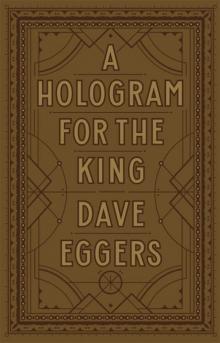 A Hologram for the King
A Hologram for the King Heroes of the Frontier
Heroes of the Frontier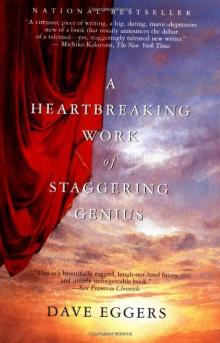 A Heartbreaking Work of Staggering Genius
A Heartbreaking Work of Staggering Genius The Best American Nonrequired Reading 2013
The Best American Nonrequired Reading 2013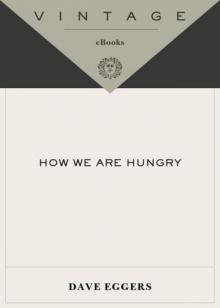 How We Are Hungry
How We Are Hungry The Circle
The Circle What is the What
What is the What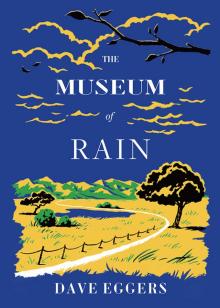 The Museum of Rain
The Museum of Rain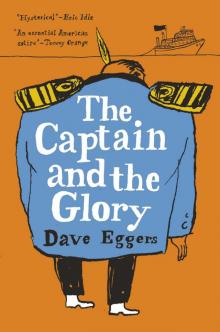 The Captain and the Glory
The Captain and the Glory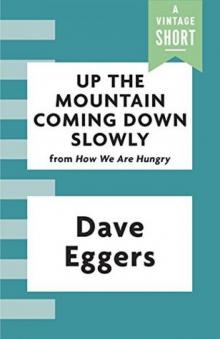 Up the Mountain Coming Down Slowly
Up the Mountain Coming Down Slowly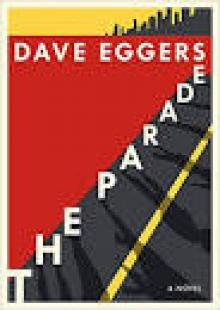 The Parade
The Parade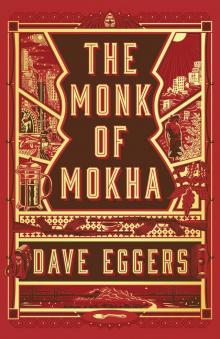 The Monk of Mokha
The Monk of Mokha Your Fathers, Where Are They? And the Prophets, Do They Live Forever?
Your Fathers, Where Are They? And the Prophets, Do They Live Forever? You Shall Know Our Velocity
You Shall Know Our Velocity The Wild Things
The Wild Things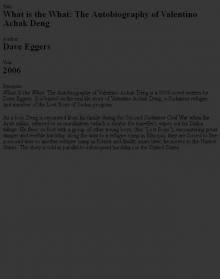 2006 - What is the What
2006 - What is the What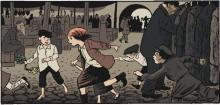 The Best American Nonrequired Reading 2011
The Best American Nonrequired Reading 2011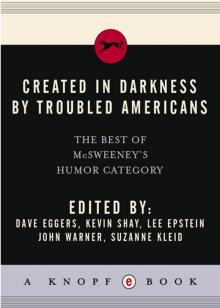 Created in Darkness by Troubled Americans
Created in Darkness by Troubled Americans